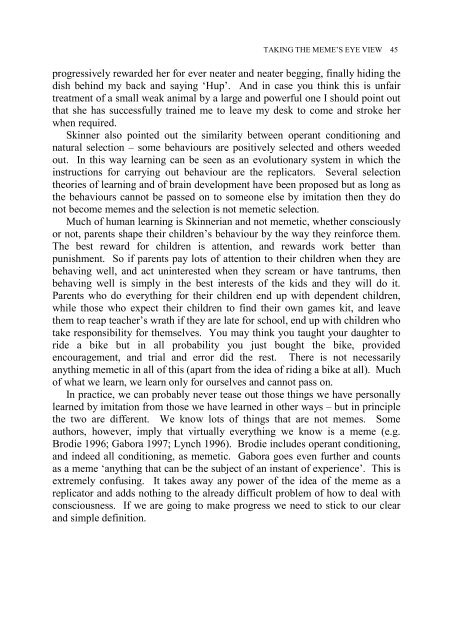The Meme Machine
TheMemeMachine1999
TheMemeMachine1999
- No tags were found...
You also want an ePaper? Increase the reach of your titles
YUMPU automatically turns print PDFs into web optimized ePapers that Google loves.
TAKING THE MEME’S EYE VIEW 45<br />
progressively rewarded her for ever neater and neater begging, finally hiding the<br />
dish behind my back and saying ‘Hup’. And in case you think this is unfair<br />
treatment of a small weak animal by a large and powerful one I should point out<br />
that she has successfully trained me to leave my desk to come and stroke her<br />
when required.<br />
Skinner also pointed out the similarity between operant conditioning and<br />
natural selection – some behaviours are positively selected and others weeded<br />
out. In this way learning can be seen as an evolutionary system in which the<br />
instructions for carrying out behaviour are the replicators. Several selection<br />
theories of learning and of brain development have been proposed but as long as<br />
the behaviours cannot be passed on to someone else by imitation then they do<br />
not become memes and the selection is not memetic selection.<br />
Much of human learning is Skinnerian and not memetic, whether consciously<br />
or not, parents shape their children’s behaviour by the way they reinforce them.<br />
<strong>The</strong> best reward for children is attention, and rewards work better than<br />
punishment. So if parents pay lots of attention to their children when they are<br />
behaving well, and act uninterested when they scream or have tantrums, then<br />
behaving well is simply in the best interests of the kids and they will do it.<br />
Parents who do everything for their children end up with dependent children,<br />
while those who expect their children to find their own games kit, and leave<br />
them to reap teacher’s wrath if they are late for school, end up with children who<br />
take responsibility for themselves. You may think you taught your daughter to<br />
ride a bike but in all probability you just bought the bike, provided<br />
encouragement, and trial and error did the rest. <strong>The</strong>re is not necessarily<br />
anything memetic in all of this (apart from the idea of riding a bike at all). Much<br />
of what we learn, we learn only for ourselves and cannot pass on.<br />
In practice, we can probably never tease out those things we have personally<br />
learned by imitation from those we have learned in other ways – but in principle<br />
the two are different. We know lots of things that are not memes. Some<br />
authors, however, imply that virtually everything we know is a meme (e.g.<br />
Brodie 1996; Gabora 1997; Lynch 1996). Brodie includes operant conditioning,<br />
and indeed all conditioning, as memetic. Gabora goes even further and counts<br />
as a meme ‘anything that can be the subject of an instant of experience’. This is<br />
extremely confusing. It takes away any power of the idea of the meme as a<br />
replicator and adds nothing to the already difficult problem of how to deal with<br />
consciousness. If we are going to make progress we need to stick to our clear<br />
and simple definition.



